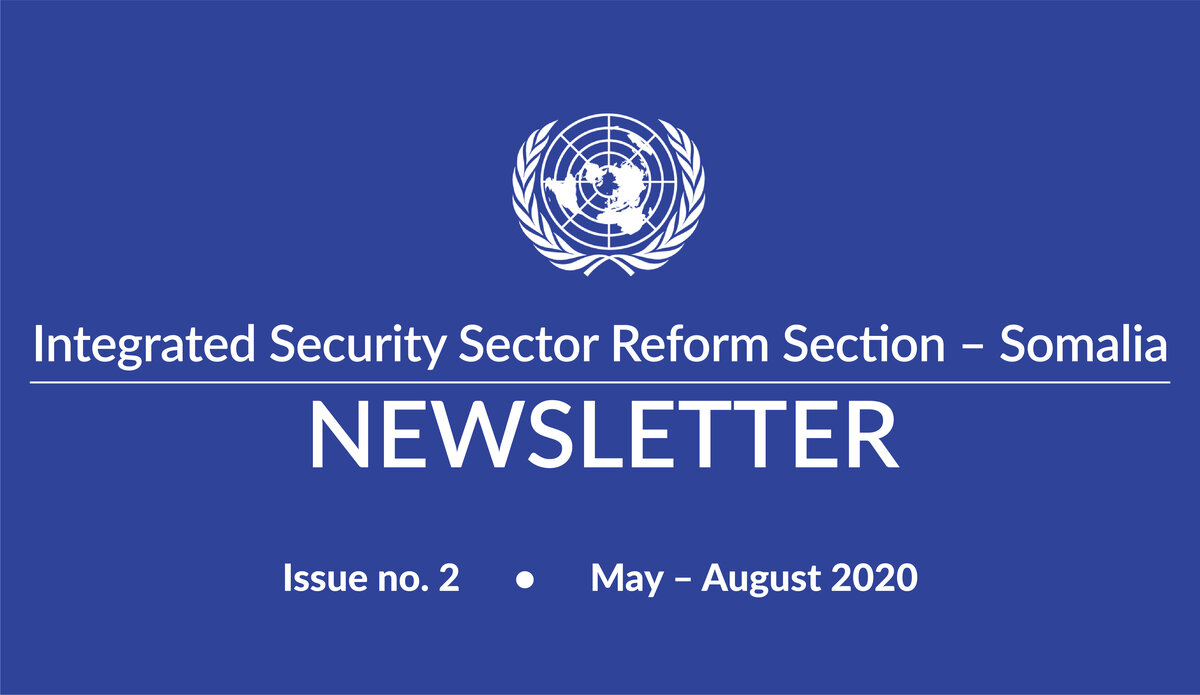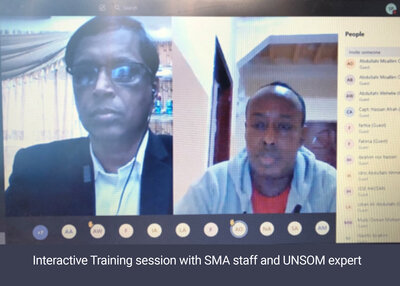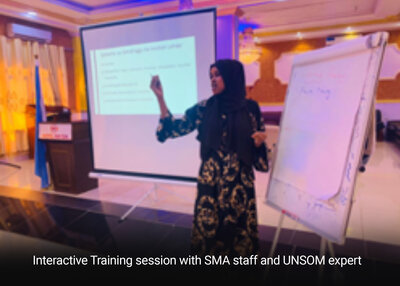NEWSLETTER HIGHLIGHTS
Institutional Capacity Building for Somali Maritime Administration (SMA) Department of Ministry of Ports and Marine Transport
Under the auspices of capacity building for the Somali Maritime Administration Department within the Ministry of Ports and Marine Transport, UNSOM has successfully delivered 5 virtual training sessions and trained 22 SMA staff members during July and August 2020. The training provided an opportunity for SMA staff to increase their professional skills in the areas of report writing, interpersonal communication skills, effective meetings, leadership and management and gender awareness. Issues relating to the Women, Peace & Security Agenda and the ‘Women in Maritime Sector (WiMS)’ Initiative were also covered. The training will contribute to the effective delivery of the SMA mandate and help the staff in their day-to-day administration. Read more...
The Joint Security Sector Governance Programme (JSSGP) supports Training of Trainers – A Capacity Building Approach through Knowledge and Skills Transfer for Security Sector Governance Institutions
From 29 August to 3 September in Mogadishu, the JSSGP supported the Ministry of Internal Security (MOIS) to organize a Training of Trainers (ToT) workshop on leadership and management, core office skills and Security Sector Reform, Women Peace and Security and Human Rights for participants from the MOIS, the Office of the Prime Minister, the Ministry of Defence and the Benadir Regional Administration. This ToT training ensures participants have the knowledge and tools to implement trainings to colleagues in their respective institutions, ensuring that the capacity building is uniform, of high quality and delivered in accordance with civil service standards. Read more...
UN ‘Security and Rule of Law Pillar Working Group (PWG 2)’ consults with the Federal Government/Federal Member States/International Partners/UN Agencies, Funds and Programs to identify UN Strategic Objectives for the next 5 Years
The PWG2 have undertaken an internal analysis and external consultations that will inform the new UN Cooperation Framework (UNCF) covering the next 5 years (2021-2025). The FGS, FMS and CAS Strand International Partners (IPs) were consulted in order to find consensus to set UN objectives in support of all segments of Somali society, including the most marginalized. Among other results, participants identified Weak Security and Rule of Law Institutions as one of the main challenges to be addressed in Somalia in the next 5 years. Read more...
Upcoming World Maritime Day
World Maritime Day, with the theme of ‘Sustainable Shipping for a Sustainable Planet’ will be observed on 24th September 2020, with the Federal Government of Somalia /Ministry of Ports and Marine Transport conducting a high-level conference to mark this day, supported by UNSOM. With this initiative the Federal Government of Somalia aims to develop benchmarks to achieve sustainable shipping for Somalia in support of global endeavours. The conference also aims to chart a plan to address women’s role in the shipping industry and engage the maritime community on the impact of COVID-19 pandemic in maritime sector. The conference is expected to have an attendance of 50 participants in Mogadishu from a range of maritime stakeholders, including CSO, coastal community and academia, who will be joined virtually by FMS stakeholders and representatives of the International Community. Read more...
Go to top ↑
Institutional Capacity Building for Somali Maritime Administration (SMA) Department of Ministry of Ports and Marine Transport
In support of Somalia’s efforts to strengthen and operationalize the Somali Maritime Administration (SMA) to effectively perform the responsibilities mandated by International maritime law and subsequent national regulations, UNSOM supported major initiatives based on the priorities identified by the SMA to attain Initial Operational Capabilities (IOC) by the end of 2020, namely legal compliance, ship registration, crew certification and the establishment of a Maritime Rescue Coordination Centre (MRCC).
SMA recent developments and relevant milestones include the development and translation of a revised Shipping Code for Somalia approved by the Ministry of Ports and Marine Transport (MPMT) in March 2020. The revised Shipping Code, which was last amended in 1988, is a significant step forward for Somalia and aims to ensure compliance to latest international maritime frameworks, such as the United Nations Convention on Law of the Seas (UNCLOS). This is an encouraging achievement since it brought together key stakeholders, including Members of Parliament, Senators, representatives from IMO, UNSOM, UNODC, WFP and EUCAP. The formal legislative process will soon commence through the Office of the Prime Minister.
The Federal Government of Somalia has also acceded to two key international maritime conventions, namely the International Convention for the Safety of Life at Sea (SOLAS) and the International Convention for Prevention of Pollution from Ships (MARPOL), which entered into force in Somalia last 16 June 2020 and pave the way for enhanced regulation and jurisdiction within Somali waters in compliance to its flag, port and coastal state duties. In support of Somalia’s efforts to develop a sustainable, transparent and affordable long-term plan towards achieving synergies between maritime security and Blue Economy opportunities, UNSOM and EUCAP Somalia are providing support towards the domestication of the Shipping code and MARPOL and SOLAS conventions, including legal advice to develop legal frameworks and regulations to tackle illegal foreign fishing activity, dumping of toxic wastes, and unregulated economic activity. These areas have been prioritized by the MPMT and SMA and will have a positive impact in Somalia’s commercial opportunities to exploit a globally strategic shipping route and rich fish stocks, increasing employment opportunities, thereby serving as a catalyst in securing Somalia’s coastline and developing the country’s Blue Economy.
An induction training programme for newly recruited SMA staff was delivered over 19-23 January 2020 in Djibouti by IMO, UNSOM and EUCAP Somalia, focusing on Ship Registration, Crew Certification and Maritime Rescue Coordination Centre operations.
In support of Ship Registration, UNSOM supported and provided strategic and technical guidance to SMA in developing draft regulations on ship registration, ship safety certification and safe manning. Achieving these milestones will set the conditions for the establishment of a comprehensive legislative framework, where Somalia can serve as a preferred port of destination and registration of ships, fostering and increasing Somalia’s commercial opportunities. Furthermore, the SMA staff has been active during the COVID-19 pandemic and requested basic capacity building trainings to be provided by UNSOM which were successfully delivered in August 2020.
Go to top ↑
The Joint Security Sector Governance Programme (JSSGP) supports Training of Trainers – A Capacity Building Approach through Knowledge and Skills Transfer for Security Sector Governance Institutions:
The Somali Security Sector Governance institutions are of key importance to enhance civilian oversight and improve security for all Somalis in line with the rule of law and respect for human rights. The two-year Joint Security Sector Governance Programme (JSSGP) is supporting the Federal Government of Somalia (FGS) and Federal Member States (FMS) security sector governance institutions’ staff members to build their capacity, in order to promote effectiveness and professionalism.
Training of Trainers Process
To promote sustainability and Somali ownership, several of the capacity building programme workshops are implemented through a Training of Trainers (ToT) methodology that is incorporated within each institution. Through the ToT process, assigned participants from beneficiary institutions participate in workshops that provide them with the knowledge and tools to implement trainings to colleagues in their respective institutions, ensuring that the capacity building is uniform, of high quality and delivered in accordance with civil service standards. The participants subsequently develop an Action Plan for in-house trainings for their respective institutions to be implemented in the coming weeks and months.
Workshop for federal government institutions
From 29 August to 3 September, the JSSGP supported the Ministry of Internal Security (MOIS) to organize a ToT workshop in Mogadishu with participants from the MOIS, the Office of the Prime Minister, the Ministry of Defence and the Benadir Regional Administration. During the six-day workshop, trainers from the National Civil Service Institute (NCSI) facilitated the ToT session and provided expertise on a variety of topics, which included leadership, management and facilitation skills. The UNSOM-UNDP Integrated Security Sector Reform Section further delivered virtual sessions on Security Sector Reform and Gender, Women Peace and Security and the UNSOM Human Rights Protection Group provided trainings covering human rights standards, the UN human rights due diligence policy and child protection. The next ToT workshop will benefit participants from the Federal Member State institutions.
Go to top ↑
UN ‘Security and Rule of Law Pillar Working Group (PWG 2)’ consults with the Federal Government/Federal Member States/International Partners/UN Agencies, Funds and Programs to identify UN Strategic Objectives for the next 5 Years
Context
The UN Strategic Framework (UNSF) (2017-2020) is set to expire at the end of 2020, and will be replaced by the UN Cooperation Framework (UNCF) covering the next 5 years (2021-2025). It will guide the UN’s work and articulate its collective strategy, commitments and actions in support of the Federal Government of Somalia (FGS) and Federal Member States (FMS). The UNCF will support the four strategic priorities articulated in the Somali National Development Plan (NDP 9), with priority, among others, the promotion of Security and Rule of Law.
Process
In recent weeks, UN entities engaged with the NDP 9 Pillar Working Group 2 (PWG2) ‘Improved Security and Rule of Law’ (including UNSOM, UNSOS, UNMAS, UNHCR, UNOPS, UN Habitat, UNODC, UN Women, IOM, UNEP), which undertook an internal analysis of the roots, drivers and impact of conflict and instability in Somalia. Then, the FGS, FMS and CAS Strand International Partners (IPs) were consulted on the analysis undertaken to find consensus in order to set UN objectives in support of all segments of Somali society, including the most marginalized. Noting the cross-cutting nature of conflict drivers, it was also important to understand ‘chains of causality’ to guide programme interventions and the analysis was informed by the Somali National Threat Assessment.
The virtual dialogue between the UN, FGS, FMS and IPs used the Comprehensive Approach to Security (CAS) structure and was held over two sessions, each of 90 mins. A total of 63 individuals attended, including representatives of the FGS (Office of the President, Office of the Prime Minister, Ministries of Defence, Internal Security and Justice), FMS, International Co-Leads of the CAS Strands, and various UN entities. Moreover, prior to each session participants completed an on-line survey based on the conflict and instability analysis undertaken.
Results
Conflict drivers
Participants identified weak Security and Rule of Law Institutions as either the first or second challenge to be addressed, and specifically cited its negative impact on the development of the nascent but critical Maritime Sector (reference to which it was noted is absent from the Constitution). All participants cited the complex interlinked and cross-cutting nature of the key drivers of conflict.
Additional conflict drivers, notably lack of socio-economic and education opportunities, particularly for youth, recognizing that it is both a cause and a byproduct of so many other identified conflict drivers like excessive clannism, intolerance/ radicalization/terrorism and use of children in armed conflict, and that addressing these issues will yield a broad array of peace dividends. In this regard, participants cited the importance of targeted socio-economic programmes following in the wake of successful military operations to capture terrain from Al Shabaab.
Participants highlighted the lack of community empowerment and a comprehensive reconciliation process, referencing both a general need for inclusivity, but also targeted measures in-line with historic measures taken with the creation of the South African Truth and Reconciliation Commission. They indicated that unresolved conflicts will re-emerge if not addressed at a grass roots level. They also called for the inclusion of Climate Change as a significant, and growing issue that will cross-cut many of the identified conflict drivers.
Participants cited the lack of agreement on federalism as one of the main conflict drivers facing Somalia, contributing to excessive clannism and posing significant blockages to FGS/FGM coordination, the creation of legal frameworks, the Constitutional agreement, the implementation of National Security Architecture and the collective fight against terrorism. They also suggested to include political disputes relating to power dynamics, federalism, the implementation of the National Security Architecture and the need for popular consultations on the matter.
Participants further cited that excessive clannism is more a by-product of manipulation by elites than a concern of the majority of the population. Some linked Excessive clannism to persistent territorial disputes, through displacement of people, and both viewed it as a by-product of weak/fragmented/limited Rule of Law & Security Institutions, i.e. bolstering the said institutions would significantly address the problem by making the population less dependent on clan institutions.
UN priorities over the next five years
Participants ranked what they considered should be the UN thematic priority areas in the next 5 years, agreeing on strengthening the security sector and transition at the top, but also completing legal frameworks, agreeing on federalism and strengthening justice institutions.
Leave no-one behind
Participants highlighted the importance of broad and inclusive consultation processes including all vulnerable segments of society in the context of program/intervention design, such that vulnerable groups are aware that they have a voice in Justice, Security and Governance institutions.
Participants agreed on the challenges of vulnerable groups accessing key public services. They extensively discussed the importance of Community Policing, stipulating that policing strategies should be conducted in consultation with marginalized groups, but also feature their integration. The same logic was applied to the structuring of security, justice and governance institutions notably as regards the inclusion of women; i.e. training and educational opportunities (including in law) to ensure women and girls have the opportunity to become qualified, and female recruitment quotas (including at the most senior levels), notably in the security sector but also in the justice system. Participants cited that a system of clan quotas marginalizes women as women are rarely selected to represent clans. Participants also highlighted the importance of civic education programs for men/tribal/clan elders concerning the benefits of empowering women.
Participants also cited the specific access issues of the disabled to security and justice services and facilities, advocated for recruitment quotas and called for educational and skills training.
Participants cautioned that the political inclusion of youth was not nearly as important as ensuring their (free and compulsory) access to education, employment opportunities and athletic pursuits, including the investment in facilities to make this possible. Also, participants stated that the best means of serving the justice and security needs of Somali children is to build the capacity of security/justice sector to deal with cases involving children as victims, adapting juvenile justice to children offenders and called for legal aid and psychosocial services.
Concern was also expressed over the political exclusion of IDPs particularly as regards the impact of displacement in the context of elections and the need for intercommunal conflict resolution mechanisms. They also proposed the establishment of police stations and courts inside IDP/Returnee camps.
All agreed on the need to be inclusive of ethnic minorities, but some questioned the modality of how that is being pursued at present. They highlighted some of the tacit benefits of clan structures, but also referenced some of the shortfalls of the 4.5 system of political representation, citing the marginalization of the pejoratively labelled “.5” minorities, but also similarly evoked the relative political exclusion of women, youth and sub clan minorities within the 4 major clans in the context of clan based representation systems.
Finally, participants identified the need for a legal framework to protect these vulnerable groups, the need to apply existing conventions and review current legislation to promote everyone´s rights.
Go to top ↑
Upcoming World Maritime Day
World Maritime Day, with the theme of ‘Sustainable Shipping for a Sustainable Planet’ will be observed on 24th September 2020, with the Federal Government of Somalia /Ministry of Ports and Marine Transport conducting a high-level conference to mark this day, supported by UNSOM. With this initiative the Federal Government of Somalia aims to develop benchmarks to achieve sustainable shipping for Somalia in support of global endeavours. The conference also aims to chart a plan to address women’s role in the shipping industry and engage the maritime community on the impact of COVID-19 pandemic in maritime sector. The conference is expected to have an attendance of 50 participants in Mogadishu from a range of maritime stakeholders, including CSO, coastal community and academia, who will be joined virtually by FMS stakeholders and representatives of the International Community.
Go to top ↑
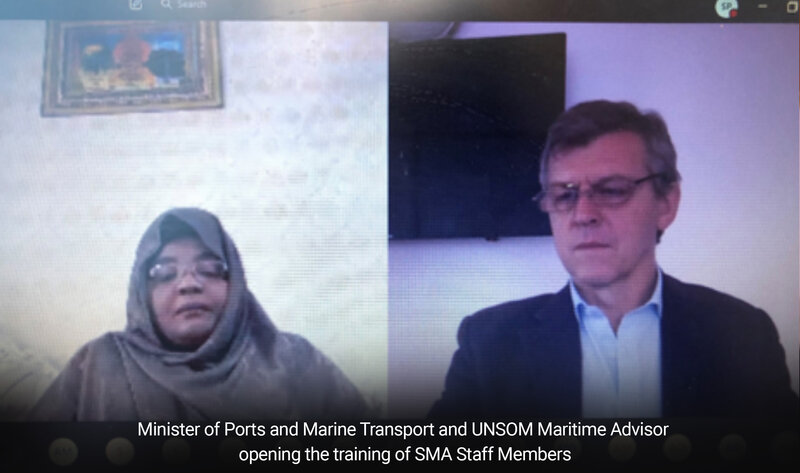
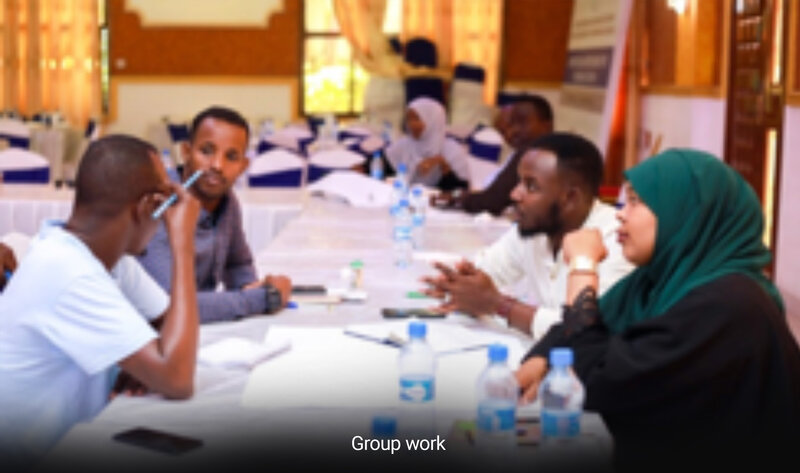
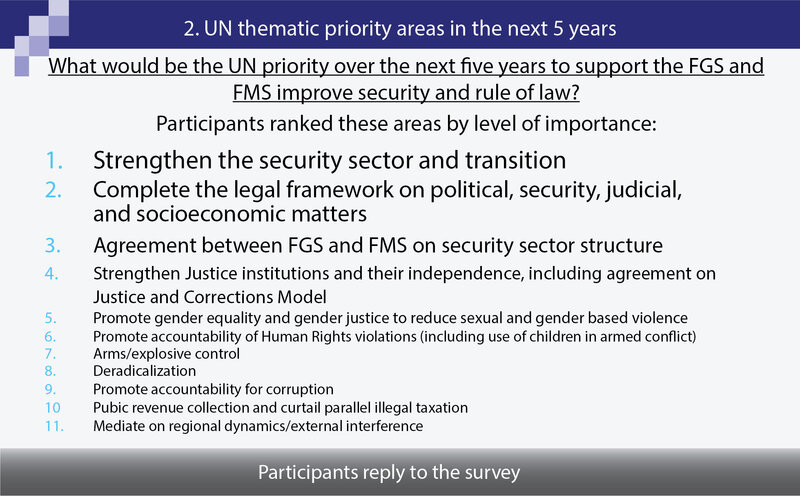
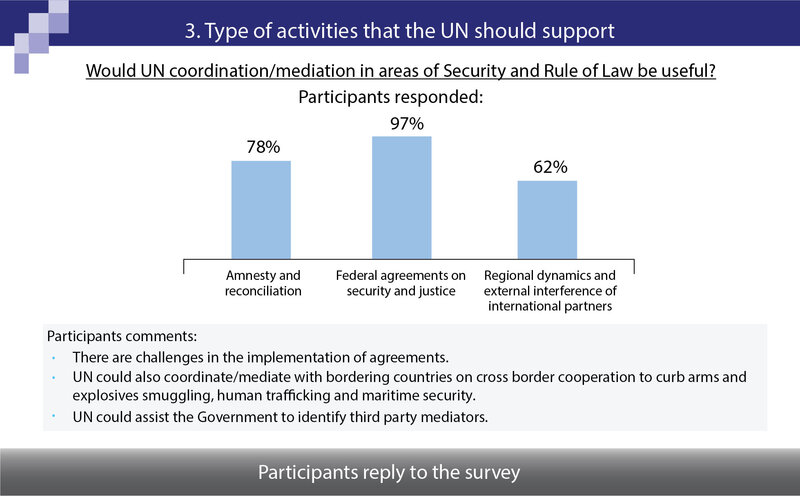
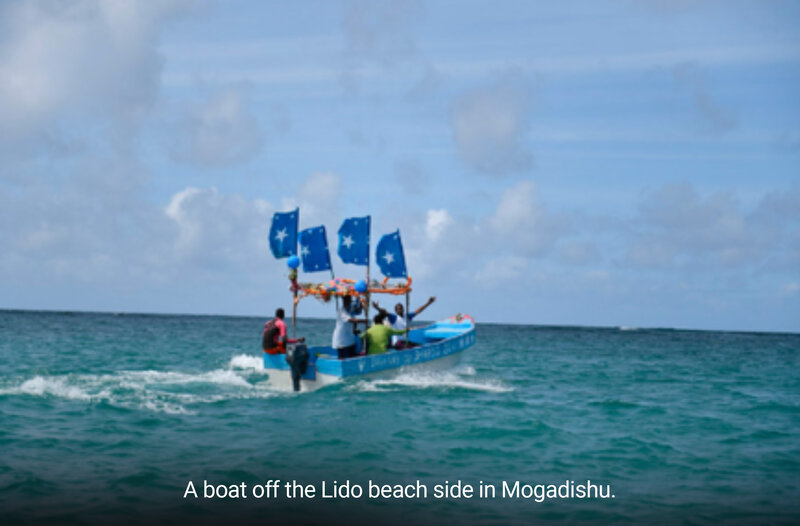
 UN
UN
